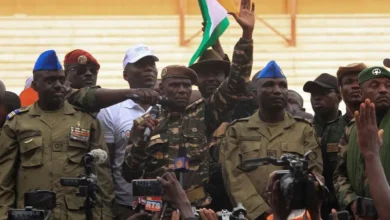Israel’s military failed the nation, but that won’t end Israeli militarism
Haim Bresheeth-Žabner

Haim Bresheeth-Žabner
The bitterness and determination to bring down his government had galvanised more than half of the country. Remarkably the protests were joined by former officers from the army, Mossad and Shabak, as well as employees of leading high-tech companies which make up the backbone of the Israeli military industrial complex (MIC).
It looked like Netanyahu would fall within months. As all eyes were focused on a much-awaited verdict of the Supreme Court on one of his government’s judicial legislation changes, no one was paying much attention to Gaza. Despite intelligence warnings from Egypt, Hamas’s attack on October 7 came as a surprise.
To fully comprehend the shock it inflicted on the Israeli society, one needs to go back to the point of creation of the Israeli nation.
A nation-building institution
The building of the Israeli army started well before the creation of Israel. The Zionist leadership in British-ruled Palestine was well aware of the need for a modern military force to take the land from its indigenous population. Zionist organisations controlled less than 7 percent of the Palestinian territories as late as 1946.
Throughout the 1920s and 1930s, three competing organisations – Haggana, Irgun and Lehi – secretly and illicitly trained and armed tens of thousands of fighters and built rudimentary but efficient armament plants. By the end of the 1948 Arab-Israeli war, their ranks swelled to 120,000 troops, as thousands of British soldiers who had fought in World War II and survivors of Nazi Germany’s death camps joined them.
During the 1948 war, this formidable force easily defeated the few thousand untrained irregulars from Palestine and the rather inferior forces from the surrounding Arab polities – Jordan, Egypt, Syria and Iraq. As a result, some 750,000 Palestinians were expelled while the new state of Israel came to control 78 percent of Palestine.
Newly created Israel had a large army but had no nation. The 650,000 Jews within the new polity were far from a homogenous group: They spoke numerous languages, came from diverse cultures and did not share a political ideology.
This was immediately noted by Israel’s first prime minister, David Ben-Gurion. The nation he would create would be a nation at arms, in a permanent state of neither peace nor war. To make this mode of existence into Israel’s modus vivendi, a major social engineering project lasting decades would follow, requiring constant renewal.
Thus, just as the Israeli state was created by the Zionist army, so too was the Israeli nation. After all, it was the largest, richest, and most powerful institution in Israel. Drafting all male adults, as well as many women, created a common experience on the basis of which common identity started to emerge, grounded in conflict with the Palestinians and the Arab nations.Through a long series of wars initiated by Israel, as well as more limited military campaigns in between, a national identity was created totally dependent on the Israeli army. Other issues could divide the Israelis, but – almost – all were members of the largest club in society, one which cut across class, culture, language and religious boundaries. The army became an organisation trusted by all Israeli Jews, as opposed to all other, civic and state organisations, which divided rather than united Israelis.
Israel became a warrior democracy akin to a modern Sparta, with a citizen army of Jews and a small minority of Druze and Bedouins.
From a professional army to a colonial police force
The army in Israel was elevated in public opinion to such heights that even when the Egyptian and Syrian forces dealt it a devastating blow in the 1973 war, the blame was mainly put on the politicians, like Prime Minister Golda Meir and Defence Minister Moshe Dayan, rather than on army officers.
The partial defeat was an early sign of an important process which had started in 1967, transforming the army into a glorified colonial police force. Its troops, instead of focusing on the threat of fighting back foreign armies, were tasked with subjugating more than a million Palestinians in the newly occupied West Bank and Gaza. As the Israeli state started settling these lands illegally, the military was deployed to guard and facilitate the process.
Another factor that further accelerated this transformation was peace-making and normalisation with Arab states achieved with the help of Israel’s closest ally, the United States, pressuring these nations. These diplomatic efforts totally disregarded the Palestinians.
Normalisation started with Egypt signing a peace treaty in 1979, which was followed by Jordan in 1994. Then came the Abraham Accords of 2020 with the UAE, Bahrain, Morocco and Sudan also normalising relations, and Saudi Arabia declaring plans to follow suit.










